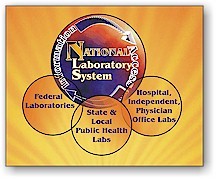|
|
 |
 |
 |
 |

|
Washington
Clinical Laboratory Initiative
|
The work occurring
in Washington under the direction of the principal investigator, Dr. Jon
Counts, former Director of the Washington Public Health Laboratory is
using a model based at the University of Washington School of Public
Health, where he is a professor. Dr. Counts is continuing work he began in
the 1990's to
effect systematic improvements for public health testing under the
auspices of the Clinical Laboratory Initiative. Through the Initiative,
Dr. Counts has made improvements ranging from creating standards for
appropriate use and interpretation of public health testing to increasing
Medicare payments for testing of public health importance.
|
 |
Building strong partnerships:
- Strategic partnerships are designed to effect grass root changes
under guidance of world renown experts in public health practice and
laboratory testing; partners include:
- Pacific Northwest Center for Public Health Practice
- Clinical Laboratory Advisory Council of practicing laboratory
professionals
- Regional focus groups with laboratory professionals
- A Steering Committee of experts in infectious disease clinical
practice, epidemiology and clinical laboratory science and health
care public policy
|
 |
Assessing the need to improve testing for antimicrobial
resistance:
- Microbiology laboratories throughout the state were surveyed for
understanding of, and adherence to, guidelines for appropriate testing
for resistance to antibiotics, a problem of high national priority.
- Survey questions were designed with input from experts at the CDC,
UCLA and expertise within Washington.
- Of the approximately 100 laboratories that perform testing for
resistance to antibiotics, more than 75% responded to the survey.
- Laboratories appear not to be following voluntary laboratory
practice guidelines, which may affect patient care and public health
surveillance, such as failure to:
- utilize current NCCLS charts which may contribute to erroneous
results, leading to treatment failures and false assumptions about
antimicrobial resistance
- respond appropriately to case studies, revealing a level of
competence by individuals performing AST which may contribute
to inappropriate and costly testing
- utilize appropriate number and type of antimicrobials in AST,
which may contribute to treatment failures and insufficient data
on antimicrobial resistance in an institution of community
|
 |
Defining strategies to deliver training where it is needed
most:
- Appropriate interventions for target audiences are being designed
based upon survey questions correlating laboratory characteristics,
access to educational media (PCs, Internet, satellite downlinks, etc),
and measured gaps in laboratory practice.
- Dr. Counts is investigating reasons why voluntary guidelines for
testing for resistance to antibiotics are not being following (e.g.
lack of awareness, insufficient credibility of experts, insufficient
resources (personnel, time or money).
|
 |
Translating knowledge into improved practices:
- An educational series on testing for resistance to antibiotics will
be disseminated throughout the state using VHS tapes and/or CD ROM
materials as well as utilization of the MASTER
website; world-class lecturers will participate. Data from the survey
was presented to the laboratory community in a videoconference on
November 15th, 2001. The debut lecture on general topics in quality assurance of clinical
microbiology testing will be broadcast via videoconference April 16,
2002 to clinical
laboratories throughout the Northwest.
- A CD-ROM "Antimicrobial Susceptibility Testing" developed
in cooperation with CDC NCID, will be demonstrated April 15, 2002 in a
"Train-the-Trainer" format. These trainers will
include CMS inspectors, academicians and bench technologist who will
demonstrate and promote the CD-ROM to Level A laboratorians throughout
the states.
- A pilot project in a local county has already resulted in hospital
laboratories agreeing to standardize their testing for Streptococcus
pneumoniae, i.e. the antimicrobials that should be tested and the
testing scheme which would reduce turnaround time in results.
- A website was developed to describe and promote the Clinical
Laboratory Initiative and there is a link to the CDC MASTER website to
improve antimicrobial susceptibility testing with education with case
studies.
|
 |
Assessing the Impact
- Laboratories were surveyed to determine their awareness of efforts
to implement changes in laboratory practices. The publication
eLaborations was especially effective but generally the Initiative was
found to need more effective promotion.
|
 |
Investigating factors that influence decision-making and
establishment of clinical laboratory policies and testing protocols
- Factors a laboratory considers in selecting methodologies, testing
procedures and protocols
- Evaluation of new procedures
- Factors that influence adoption of national and local standards of
laboratory practice
- Factors that should be considered in determining the scope of
clinical microbiology services that should be offered on-site versus
those that should be referred
- Factors that should be addressed in a survey of clinicians and
clinical laboratorians concerning their perceptions of the quality of
microbiology reference testing services.
|
|
|
|
This page last reviewed: 7/12/2004
|
|